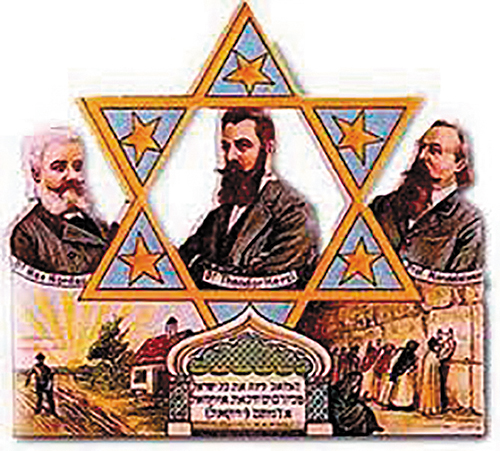There was a great deal of religious ambivalence about Zionism in its early years. On one hand, the return to the Land of Israel had always been a religious aspiration of the Jewish people, and yet the nascent movement was a secular movement to its core, whether in the neutral sense that it viewed state-building as a non-religious endeavor, or in the anti-religious sense of jettisoning the exilic Jewish past in favor of a new Jew and a new anticlerical and anti-bourgeois ideology. Some rabbis advocated making common cause with religiously neutral forms of Zionism, but the majority opposed the new movement as long as it would remain a secular movement.
A third attitude, which came to dominate religious Zionism, was articulated by Rabbi Abraham Isaac Kook in the early 20th century. In his view, even the arch-secularist, anticlerical Zionist pioneers were animated by pure and holy motives. He contended that in order for the ultimate redemption to occur, the Jewish people would have to rebuild the material aspect of its existence, an aspect that had been neglected in the long exile. The Marxist materialism of secular ideologues was a necessary step, for Rabbi Kook, in the redemptive process ushered in by Zionism. In this sense, despite their outward contempt and hatred for the Jewish religion, these Zionist pioneers were motivated by messianic zeal to create a Jewish utopia in their ancient homeland.
Rabbi Kook’s view drew criticism from religious Jews of his time, who felt that he gave to much credit, and even ascribed a degree of sanctity, to those who sought to cast off the yoke of heaven. Yet he was also criticized by secularists who felt he was misinterpreting their motives and movements as being religiously motivated when in fact the opposite was the case. Relatively recently, Sefi Rachlevsky criticized Rabbi Kook’s view of secularism in a book called The Messiah’s Donkey. The book is named for a talmudic metaphor that Rabbi Kook applied to secular Zionism—the materialist movement (the Hebrew word for “material”—chomer—is closely linked to the word for “donkey”—chamor) that presages and will ultimately be subordinate to the true messianic redemption. Indeed, at first glance, it seems that Rabbi Kook’s noble attempt to view a massive rebellion against religion as a subtly religious movement was too optimistic and misguided.
Reading and reviewing Ari Shavit’s My Promised Land has given me a new appreciation of Rabbi Kook’s claim. Shavit, whether he is aware of it or not, constantly uses religious language to describe even the most secular manifestations of Zionism and Israel. On the very first page of his introduction, he refers to Israel as “the third Jewish temple.” Politicians Moshe Dayan and Yossi Beilin, neither of whom are known for their appreciation of Jewish religion, are quoted in the book as using the same language. At Ein Harod, one of the first kibbutzim and a bastion of Marxism, a “new Old Testament” is being written; the communal dining room becomes a place of worship; charismatic ideologue Yitzhak Tabenkin becomes the “rabbi” who “rises up religiously” against religion (p. 42). Shmaryahu Gutman, a youth leader enamored with the idea of the new Jew with a new national mythos, transforms Masada into a potent symbol of Zionism’s assumption of “the Messiah’s sacred mission.” It is clear throughout the book that the idealism and utopianism that attracted the early pioneers cannot be decoupled from Judaism’s redemptive messianic vision.
Yet it is clear that Shavit thinks Israel is by the secular and for the secular. Religious Judaism, he agrees with the early secularists, is a Diaspora phenomenon, and has proven that it can flourish outside Israel. Within Israel, he claims, religious Judaism merely contributes to the dissolution of the state. In fact, he lays much of the blame for the corruption of his beautiful old Israel at the doorstep of the mostly Orthodox Jews who spearheaded the movement to settle Judea and Samaria, the West Bank territories that Israel conquered in 1967. It is striking, and quite ironic, that he damns this movement for being messianic, when so much of Zionism emerged from the same soil of redemptive yearnings.
It seems, then, that Rabbi Kook’s diagnosis of secular forms of Zionism has more to recommend it than meets the eye. At least in his day, secularist forms of Zionism consciously or unconsciously adopted and adapted ancient Jewish yearnings for a perfected society and world. Unfortunately, the contemporary disavowal of openly messianic Zionism, often for very good reasons, obscures the messianism of even a secularist form of Zionism and allows writers like Ari Shavit to level harsh criticism at contemporary manifestations without coming to terms with the roots of the types of Zionism he praises.
Elli Fischer is a writer, translator, and editor from Modiin, Israel. He will be scholar-in-residence over Pesach on a riverboat touring the Danube. This article fi rst appeared in the Intermountain Jewish News.
By Elli Fischer













